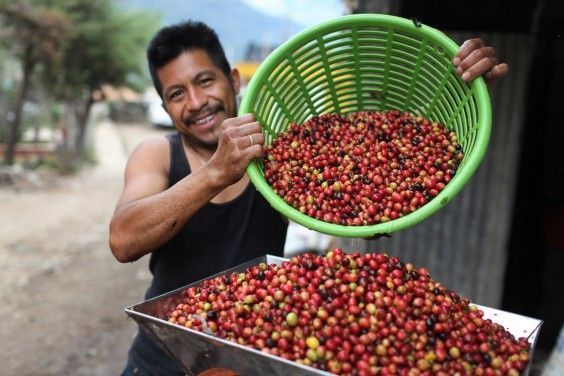What do Patagonia, Keurig, and Costco have in common? At first glance, not a lot. One brand makes activewear, one sells coffee, and another sells… well, just about everything in between.
But they have one important similarity you may not know about: They all sell fair trade products ranging from tea and coffee to apparel, body care, and home goods.
And that phrase signifies a lot more than you may realize. It means those items are produced according to rigorous social, environmental, and economic standards, so you, the consumer, can make a difference in the lives of workers all over the world with every product you purchase.
How can a simple jacket, cup of coffee, or bottle of lotion make that much of an impact? Keep reading to find out.
How Fair Trade Benefits Workers—and the Earth
1. Fair trade helps ensure basic human rights for farmers and workers around the world.
There are a few organizations that help promote fair trade practices, each of which takes a slightly different approach. Fair Trade USA, the biggest fair trade certifier in North America, requires each product to be made, grown, or harvested under safe and sanitary working conditions. That translates to access to health care, protection from harassment and discrimination, and no child or forced labor, in addition to more than 200 other criteria. In many of the impoverished nations where fair trade producers work, these fundamental rights sadly aren’t guaranteed.
2. Fair trade benefits the planet.
Around the world, many farmers follow agricultural practices that can harm the surrounding land, such as deforestation, erosion, or the use of harmful toxins. Fair trade producers must follow eco-friendly practices that protect the natural environment, including proper waste disposal, reforestation, and water conservation.
3. The farmers, workers, and fisherman behind each fair trade product earn extra money with every sale.
Not only do fair trade organizations ensure the people who make the products are paid fairly, equally, and on time, but they also put extra cash directly into the hands of workers as something called community development funds, says Nora LaTorre, director of consumer packaged goods and tea at Fair Trade USA.
The workers get together and vote democratically on how to use the money to best address their greatest needs and improve their community. This means it’s up to them—not a brand or nonprofit—to decide how to dedicate the funds. “Voting for and implementing projects like this allows producers to take charge of their futures in a direct, tangible way,” LaTorre says.
Some projects that communities have created using these funds include college scholarships for children and adults, housing, computer labs, English classes, and cervical cancer screenings and treatments for women. One group of 2,000 fair trade cocoa farmers in the Ivory Coast voted to build new schools and teacher housing for underserved areas and establish school lunch programs to spare children in the extended community a two-plus-hour walk home in the middle of the day.
“Primary school enrollment jumped from about 65 to 80 percent the year after these improvements were implemented, laying the foundation for ongoing education for an entire community of children,” LaTorre says.
All of this sounds awesome in theory—but how do we know producers are following the rules? Fair trade certifiers regularly check in on their producer partners. Fair Trade USA ensures farms, factories, and fisheries meet a rigorous set of standards before they become certified. Then, fair trade groups must undergo regular third-party audits. Fair Trade USA also delivers training and programs to help support long-term, lasting change, LaTorre says.
That final part is crucial. While it’s nice to have a complaint system in place, for example, it’s another matter whether farm or factory workers actually know how to use it, safely and securely, in an emergency—and that’s where training comes in, LaTorre says.
How You Can Help
The best news: You don’t have to overhaul your shopping habits. With stores from West Elm to Whole Foods jumping on board, fair trade products have never been easier to find.
“You can literally build a better world every time you shop,” LaTorre says.
Not sure where to start? Buying fair trade coffee, coconut, fish, and similar products can do a ton of good for the people behind them, LaTorre says. With that in mind, we rounded up a few of our favorite products you can find in your local grocery store or on Amazon.
1. Allegro Coffee
Allegro has been making coffee since the 80s and is the official roaster of Whole Foods. Another cool thing: If tomorrow we all made one cup of fair trade coffee, we’d drive $2 million back to coffee farmers in the form of community development funds.
2. Naked Coconut Water
These days you can’t walk down a convenience store aisle without spotting something coconut infused—from beauty products to water. And that’s not necessarily a good thing: Due to coconuts’ rise in popularity, there’s more demand than supply, and producers are struggling to keep up. Choosing Naked means you’re giving farmers the financial support they need to sustain their jobs and their lives.
3. I Heart Keenwah Chocolate Puffs
Not only are these chocolate-covered treats one of our favorite office snacks, but they’re also made with Bolivian quinoa. Why’s that such a big deal? Apparently it’s fluffier, sustainable, non-GMO, and grown by small farmers who, thanks to I Heart Keenwah’s commitment to fair trade, get paid a living wage.
4. Honest Just Green Tea
We love Honest Tea’s mission: to create awesome, healthy, organic products and run a similarly healthy, authentic business. In 2015, the company paid over $315K back to communities in the form of Fair Trade premiums, which means you really are making an impact with every sip.


